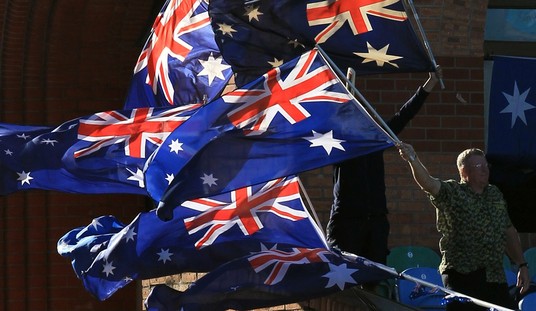[jwplayer config=”pjmedia_eddriscoll” mediaid=”63945″ width=”590″ height=”360″]
“Is there a moral case to be made for the British Empire? To even ask the question at your typical university would be to invite derision. That’s a shame because the British Empire’s legacy is one Western Civilization should be proud of,” as a historian with the seriously anglophile name of HW Crocker III explains in a video from Prager University.
The British Empire worked for centuries; and yet somehow, by the 1930s, British elites had decided that their system was exhausted and had to go, as Jonathan Last noted in a memorable 2005 article, with ramifications to today’s dissipated elites on both sides of the Atlantic. Coincidentally, in the 1930s, someone on the other side of the Channel was pretty sure England had to go, as well:
Why did it all crumble? Several interrelated reasons – among them the grisly fact that England had lost virtually an entire generation of future leaders in the trenches of Europe. But another important cause was the waning of confidence on the part of liberal British elites, whose pacifism evolved into anti-patriotism.
In 1933, the Oxford Union — a debating society and one of the strongholds of liberal elite opinion — held a debate on the resolution “this House will in no circumstances fight for king and country.” The resolution passed. Margot Asquith, one of England’s leading liberal lights, wrote that same year, quite sincerely: “There is only one way of preserving peace in the world, and getting rid of your enemy, and that is to come to some sort of agreement with him. . . . The greatest enemy of mankind today is hate.”
Churchill disdained the new liberalism, mocking one of his opponents as part of “that band of degenerate international intellectuals who regard the greatness of Britain and the stability and prosperity of the British Empire as a fatal obstacle. . . . ” So deep was this liberal loathing of empire that even as the first shots of World War II were being fired, Churchill’s private secretary, Jock Colville, witnessed at a theater “a group of bespectacled intellectuals” who, to his shock, “remain[ed] firmly seated while ‘God Save the King’ was played.”
These elites could see evil only at home. The French intellectual Simone de Beauvoir did not believe that Germany was a “threat to peace,” but instead worried that the “panic that the Right was spreading” would drag France, Britain, and the rest of Europe into war. Stafford Cripps, a liberal Labor member of Parliament, feared not Hitler, but Churchill. Cripps wrote that after Churchill became prime minister he would “then introduce fascist measures and there will be no more general elections.”
In an important sense, the British Empire’s strength failed because its elite liberal citizens stopped believing in it.
The parallels with 21st-century America are striking. In little more than 10 years, England went from victory in World War I to serious discussions about completely disarming herself. Talk of a “peace dividend” began with the fall of the Berlin Wall and culminated 10 years later with a major draw-down of forces and the abandonment of the two-war doctrine.
Where the Great War robbed England of a generation of its best and brightest, in America the baby boom generation was lost in Vietnam or, perhaps worse, in Canada, in the Air National Guard, and in the universities, where they learned to hide and not lead. This has taken its toll. Our two baby boom presidents have been exceedingly imperfect. (As Edmund Burke once cautioned, “A great empire and little minds go ill together.”)
The American left, too, eerily echoes its British counterparts. Consider the “Peace is Patriotic” bumper stickers; the howls of protest against the nomination of John Bolton to be ambassador to the United Nations, for fear that he might be too assertive of American values; the comparison – by Sen. Richard Durbin (D., Ill.) – of American soldiers at Guantanamo Bay to Nazis and Guantanamo Bay to the Soviet gulag; the protest cries of “No blood for oil” and the left-wing fringe speculation that the endgame of George W. Bush’s 9/11 fear-mongering would be to cancel elections and establish a fascist police state.
The liberal opponents of the British Empire were proved wrong, but their misplaced disillusionment was enough to sap the vitality of imperial confidence. After rising one last time to fight Nazism, the sun set on the British Empire.
Monty Python was wrong: It isn’t the tenants that need to believe, lest the building falls down, it’s the management. If they don’t believe, neither will those who send them their rent checks, with disastrous results:
[jwplayer config=”pjmedia_eddriscoll” mediaid=”63944″]
Exit Question: Given that interwar British socialist elites took down the empire and created the modern socialist welfare state, even as they defeated the modern national socialist welfare state, why does President Obama loathe 21st century Britain so?









Join the conversation as a VIP Member